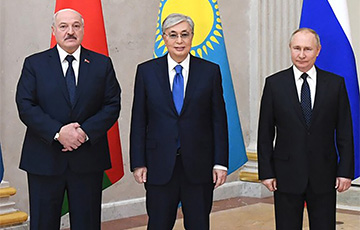‘Transport War’ Breaks Out Between Lukashenka And Kazakhstan
19- 28.11.2023, 15:31
- 50,870

Has the dictator taken offense at Tokayev?
On November 26, a resolution of the Ministry of Transport came into force, according to which trucks and tractors registered in Belarus and Russia are allowed to enter for reloading or re-coupling in specially designated places. Trucks with European license plates, as well as such transport from other states of the Eurasian Economic Union, can also still arrive for transfer. However, it seems that restrictions have been introduced on trucks from some EAEU countries. This also concerns transport from Kazakhstan. A transport war has recently flared up again between Minsk and Astana. But it so happened that the day before, President of Kazakhstan Kassym-Jomart Tokayev criticized Aliaksandr Lukashenka. Zerkalo looked into what the current resolution of the Ministry of Transport means, and how this document could affect the work of freight carriers.
At the call center of the Brest branch of Beltamozhservice, at whose transport and logistics centers trucks arrive for re-coupling or reloading, the Zerkalo journalist, who called as a carrier, was told that the new document did not change anything for the trucks with European license plates that were coming to us from abroad.
— For example, they come to us in Polish and Lithuanian cars. You cannot enter [the “specially designated places”] in Kazakh cars that are not traveling in transit,” the call center employee said.
At the customs clearance point “Brest-Beltamozhservice-2” they added that the new resolution of the Ministry of Transport does not apply to trucks that travel with European license plates.
— This [document] is only for vehicles that enter from our side. How else? For example, you want to bring Polish goods, but how can you [the European carrier] deliver these goods without visiting us? “Then it will be a complete ban,” explained the representative of the customs clearance point.
The effect of the document was similarly explained to Office Life by Igor Kovalev, Deputy Director for Regional Development of STALOGISTIC. The expert noted that the document limits countries of registration of vehicles that can come to Belarusian transshipment/interchange points and pick up goods on our side for delivery to Belarus, Russia, and EAEU countries.
Igor Kovalev said that the resolution does not apply to cars that arrive from road checkpoints at the border — we are talking about European trucks. Also, the document does not apply to cars traveling (from Asia, Kazakhstan, Uzbekistan) with cargo in customs transit mode.
However, if a Kazakh car arrives empty to pick up cargo from a Belarusian interchange point, it will not be able to do this, because at our interchange points only vehicles with Belarusian and Russian registration are left for further delivery, the expert notes.
“It’s hard to say how popular transportation was when cars from the CIS came empty for transfer of goods,” says Igor Kovalev. “Rather, these are exceptions. We use only Belarusian or Russian vehicles for delivery from exchange points, and this is not critical for us. It can be assumed that the resolution will affect the interests of companies that have some of their cars with Kazakh or other license plates.
According to the expert, cars of other registrations still came for re-coupling, most likely not empty. Therefore, Resolution of the Ministry of Transport #44 does not introduce confusion into the current delivery schemes, but clarifies who can supply vehicles for cargo operations.
From April 16, 2022, Belarus banned road carriers registered in the EU from entering the country. The State Customs Committee has identified 14 checkpoints through which European trucks can proceed to specially designated places for cargo operations and interchange. Later, in response to the closure of checkpoints by Poland, the Ministry of Transport allowed entry into Belarus for transfer only from the territory of their country.
At the beginning of June 2022, it became known that the ban on interchange for cargo carriers from Russia and Belarus was lifted in Kazakhstan. Then this decision was explained by “a manifestation of understanding and good will.” And in May 2023, the Ministry of Industry and Infrastructure Development of Kazakhstan allowed Belarusian carriers to apply the interchange and transshipment scheme until January 1, 2024.
However, in October 2023, Kazakhstan again introduced a ban on interchange for Belarusian carriers.










